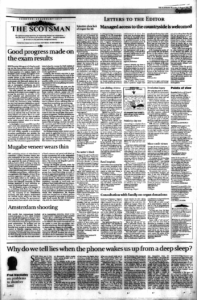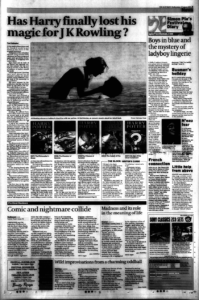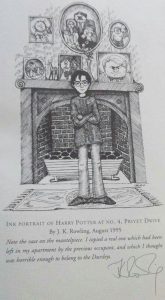I never liked New Year’s Eve in the first place. My friends and I usually crammed ourselves into any heaving pub that would have us, or else joined the swarms in Trafalgar Square, and all I have left of these fun-filled nights now are blurry memories of being elbowed in the face or jammed against strangers’ armpits. However, New Year’s Eve 1990 was supposed to be an improvement: 10 of us had rented a cottage in the country and were going to celebrate there instead. But I never saw the cottage. It was destined to be the worst New Year ever, the worst day of my life so far, because at seven o’clock that morning my father telephoned me to say that when he had gone upstairs late the previous night he had found my mother dead in bed.
Our bags were already packed ready for the trip into the countryside; all my then boyfriend and I had to do was get into the car and set off for Chepstow and my father. I will never forget how I felt as we sped along the motorway. Why wasn’t the surrounding countryside wearing mourning? Why hadn’t the universe paused out of respect? How could the radio be issuing tinny music, traffic updates and talk of a “new year” that my mother would never see? She was only 45 and I had spoken to her less than 48 hours before. Why had I ever let her get off the phone? Why hadn’t she warned me what was coming?
Of course, I hadn’t wanted to see what was literally in front of my eyes a fortnight before she died, when I had spent my last weekend with her; she had been exhausted, drawn in the face and unable to walk very far, but I simply refused to imagine what might happen if her illness worsened. I think she knew, though. Shortly before Christmas she had mentioned during a telephone call, for the first and last time, the possibility that she might not live to see me married. I would not hear it; I snapped at her not to be ridiculous, I closed my mind to what I had heard. Yet here I was, after a three-hour drive, pulling up outside a house that already felt forlorn and cold. Her clothes were there, her toothbrush, a shaky note in her handwriting about the shopping, but her body had been taken away. I could not quite grasp the full horror of it: I was never going to see her again.
Multiple sclerosis killed her. Her main symptom was a progressive loss of feeling, first in her right arm, then spreading across her chest and to her legs. From her diagnosis at the age of 35 she had become progressively iller, never having the periods of remission that the majority of people with MS experience. By her early 40s she was using a walking frame inside the house and a wheelchair outside. Only in rare cases does MS progress so rapidly and severely, resulting in death; nobody had warned us that she might die so soon – perhaps she was the only one who knew.
I remembered how she used to tell me that she awoke some mornings and believed for a few shining seconds that the feeling had returned to her legs, that she was in remission at last. I remembered how the regular telephone calls, which had once been peppered with tales of where she had been and what she had done there, became tales of what she had been reading or watching on the television, and then, ominously, mentions of how the illness was disrupting even these sedentary pleasures. I imagined how it must have felt, to be trapped inside the house, alone, for hours on end while my father worked, and I wished I had visited her every single weekend. These memories and thoughts filled most of my waking hours in the weeks after her death.
I know, of course, that these feelings are not unique to me, I know that guilt goes hand in hand with grief, as does its close relative, anger. I was very angry indeed: angry at myself, angry that my mother had died so young, angry at the illness that killed her, but also, and increasingly, angry at the care, or lack of it, that she had received.
By the very nature of her illness, which greatly restricted her mobility, she was increasingly housebound for the last few years of her life, yet the onus was always very much on her to physically move to where services were. A physiotherapist visited her at home on a handful of occasions, but this therapy was never made available to her on a regular basis, in spite of the fact that, by her own account, it made an appreciable difference to her comfort and movement. She was a very houseproud woman who would sooner crawl upstairs than leave the bedrooms undusted; social services provided a cleaner who vanished mysteriously after a few weeks and never returned. She never so much as saw an occupational therapist or a specialist nurse, though both of these are now considered crucial to good care of people with MS. Neither her neurologist nor her GP had any information to give her about services that might be available locally and as for the emotional toll the illness and isolation took on my mother, it was never acknowledged by a health professional; no kind of support or counselling was ever mentioned. The illness had countless unpleasant symptoms other than that pervasive numbness in her limbs; she suffered from incontinence, from balance and co-ordination difficulties, from muscular spasms, sleeplessness and pain, but none of this was specifically addressed either. She was left to muddle on alone, getting information where she could find it, coping as best she could. In short, there seemed to be no kind of coherent plan or strategy for the care of this still-young woman. The bottom line was that she could not be cured and nobody dealing with her care seemed much interested in what else might be done for her.
Well, that was then. No fewer than 13 New Years have passed; surely there have been great improvements in the care of people with MS since then? Unfortunately – and infuriatingly – the answer appears to be “no”. MS still seems to be treated as a “poor relation” of an illness, unworthy of much attention, effort or expenditure.
MS currently affects 85,000 people in the UK. Nobody knows why, but Scotland has the highest incidence in the world (my mother was half-Scottish). The MS Society Scotland, of which I am patron, believes strongly that there are certain very minimum standards that each person with MS, their family and carers, should be able to expect. Parts of the UK are already making some progress towards this goal; Nice (the National Institute for Clinical Excellence) is due to publish guidelines for the care of people with MS this month, which will mean a basic standard of care to which health professionals will work in England and Wales. Here in Scotland, however, no such plans exist.
So why do we need a “standard of care” too? Because at present, there is no guarantee of even minimum standards of provision. More than 3000 people across Great Britain were polled on their experiences of MS healthcare by the Mori Social Research Institute in January and February 2003. This survey identified that “Scots are the most likely to feel that a ‘postcode lottery’ determines the quality of care which people with MS get”. Fewer than a third of Scots say they can always access MS services on the NHS when they need them. Nine out of 10 of those surveyed in Scotland said care for people with MS should be better co-ordinated. Eight out of 10 respondents in Scotland say they have not been informed about the range of MS services their local health service can offer. Over three-quarters of Scottish respondents believe their quality of care depends on where they live. Over 80% say that what they have learned about MS they had to find out themselves.
These statistics make me angry all over again. My mother would have agreed with the majority on every single one of these questions. Why has nothing changed? Why are people with MS – often, like my mother, young adults at the time of diagnosis – offered so little in terms of ongoing treatment and support?
The MS Society Scotland is already funding research in Aberdeen University that I pray may lead, one day, to a cure. A national standard of care sounds much less glamorous than the search for that miracle drug or treatment, yet nothing is more important to people with MS while they wait. It is simply inhumane to neglect people because they have an inconvenient illness that won’t go away. Scotland ought to be leading the world in this area, not falling lamentably short. People’s lives are being blighted, not only by this cruelly unpredictable illness, but also by the inadequacy of their care.
This is why the Multiple Sclerosis Society Scotland is lobbying the Scottish parliament and asking that NHS QIS (Quality Improvement Scotland, which sets standards throughout the NHS) starts working on a basic standard of care for people with MS.
The list of areas where provision needs to be improved underlines how basic the demands are. They include: quick access to a neurologist; advice and support from an MS nurse at the time of diagnosis; appropriate respite care, especially for young people; information about MS and about what services are available locally; easy access to professionals with expertise in MS when it is needed. We are not asking for identical services across the country, because variation in services can be positive and creative. Nevertheless, when six out of 15 Scottish health boards still have no specialist nurse provision at all, and when people in Argyll and Clyde, Lanarkshire and Shetland wait on average over 100 days to see a neurologist after referral by their GP, they are surely right to feel let down by the system.
A national standard ought to ensure that, no matter where you live, health care professionals are aware of your basic needs and requirements and have the time and resources to meet them. But we are also looking beyond the medical/health focus, towards social care.
Would a national standard of care have made much difference to my mother? I am convinced that it would have done. Visits from a specialist nurse, proper support from social services, physiotherapy when appropriate: all would have improved her quality of life dramatically.
I used to miss being able to call Mum when I was miserable, though I’ve got used to that. Now it is the wonderful things that make me miss her most. On March 23, I gave birth to my second child, a son. My in-laws came down from Aberdeen to see him that evening with an enormous teddy made of a lamb’s fleece and we all sat and tried to decide whom the baby most resembled. It was one of the happiest evenings of my life, but after they had all gone home and left me in the hospital, I sat with the sleeping David in my arms and cried at the thought that my mother would never see him, never hold him. She would have been a year older than my mother-in-law, had she lived; she ought to have been sitting beside Barbara, vying for the first hold of David. She missed so much.
I cannot give her my time any more, but I see being patron of the MS Society as my continuing tribute to her, to all she did for me and my sister Di, and to how much we loved her. I know she would have cared deeply that nothing much has improved for people with MS in over a deca de. It now remains to be seen whether the people in Scotland with the power to change that situation care enough to make the difference.
Previous writing: « Dear German Booksellers – Book 5
Next writing: News (Desktop Website) »




